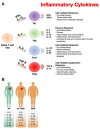Genomic and Proteomic Study of the Inflammatory Pathway in Patients With Atrial Fibrillation and Cardiometabolic Syndrome
- PMID: 33344519
- PMCID: PMC7738559
- DOI: 10.3389/fcvm.2020.613271
Genomic and Proteomic Study of the Inflammatory Pathway in Patients With Atrial Fibrillation and Cardiometabolic Syndrome
Abstract
Atrial fibrillation (AF) and cardiometabolic syndrome (CMS) have been linked to inflammation and fibrosis. However, it is still unknown which inflammatory cytokines contribute to the pathogenesis of AF. Furthermore, cardiometabolic syndrome (CMS) risk factors such as obesity, hypertension, insulin resistance/glucose intolerance are also associated with inflammation and increased level of cytokines and adipokines. We hypothesized that the inflammatory immune response is exacerbated in patients with both AF and CMS compared to either AF or CMS alone. We investigated inflammatory cytokines and fibrotic markers as well as cytokine genetic profiles in patients with lone AF and CMS. CMS, lone AF patients, patients with both lone AF and CMS, and control patients were recruited. Genetic polymorphisms in inflammatory and fibrotic markers were assessed. Serum levels of connective tissue growth factor (CTGF) were tested along with other inflammatory markers including platelet-to-lymphocyte ratio (PLR), monocyte-to-HDL ratio (MHR) in three groups of AF+CMS, AF, and CMS patients. There was a trend in the CTGF levels for statistical significance between the AF and AF+CMS group (P = 0.084). Genotyping showed high percentages of patients in all groups with high secretor genotypes of Interleukin-6 (IL-6) (P = 0.037). Genotyping of IFN-γ and IL-10 at high level showed an increase in expression in the AF + CMS group compared to AF and CMS alone suggesting an imbalance between the inflammatory and anti-inflammatory cytokines which is exacerbated by AF. Serum cytokine inflammatory cytokine levels showed that IL-4, IL-5, IL-10, IL-17F, and IL-22 were significant between the AF, AF+CMS, and CMS patients. Combination of both CMS and AF may be associated with a higher degree of inflammation than what is seen in either CMS or AF alone. Thus, the identification of a biomarker capable of identifying metabolic syndrome associated with disease will help in identification of a therapeutic target in treating this devastating disease.
Keywords: atrial fibrillation; cardiac arrhythmia; cardiovascular diseases; gene expression; heart diseases; inflammatory markers; metabolic syndrome.
Copyright © 2020 Itani, Jaffa, Elias, Sabra, Zakka, Ballout, Bekdash, Ibrahim, Al Hariri, Ghemrawi, Abi-Saleh, Khoury, Alam, Mahfouz, Jaffa, Azar and Refaat.
Conflict of interest statement
The authors declare that the research was conducted in the absence of any commercial or financial relationships that could be construed as a potential conflict of interest.
Figures

References
LinkOut - more resources
Full Text Sources
Miscellaneous

